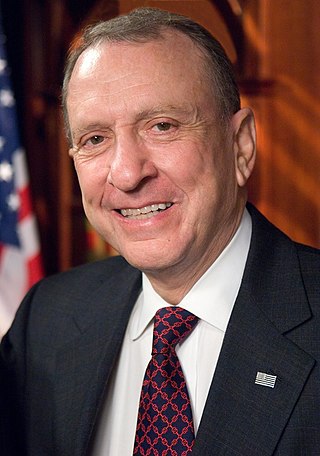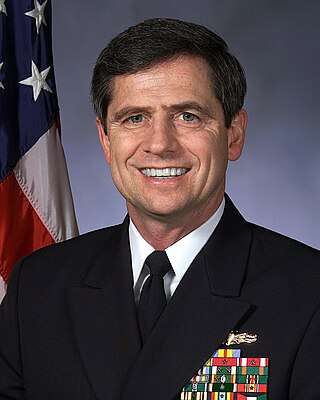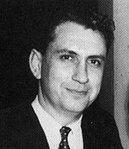
Arlen Specter was an American lawyer, author and politician who served as a United States Senator from Pennsylvania from 1981 to 2011. Specter was a Democrat from 1951 to 1965, then a Republican from 1965 until 2009, when he switched back to the Democratic Party. First elected in 1980, he was the longest-serving senator from Pennsylvania, having represented the state for 30 years.

The 1998 United States Senate elections were held on November 3, with the 34 seats of Class 3 contested in regular elections. This was seen as an even contest between the Republican Party and Democratic Party. While the Democrats had to defend more seats up for election, Republican attacks on the morality of President Bill Clinton failed to connect with voters and anticipated Republican gains did not materialize. The Republicans picked up open seats in Ohio and Kentucky and narrowly defeated Democratic incumbent Carol Moseley Braun, but these were cancelled out by the Democrats' gain of an open seat in Indiana and defeats of Republican Senators Al D'Amato and Lauch Faircloth. The balance of the Senate remained unchanged at 55–45 in favor of the Republicans.

The 1992 United States Senate elections, held November 3, 1992, were elections for the United States Senate. The 34 seats of Class 3 were contested in regular elections, along with special elections to fill vacancies. They coincided with Bill Clinton's victory in the presidential election. This was the first time since 1956 that the balance of the Senate remained the same.

The 1986 United States Senate elections were elections for the United States Senate. Held on November 4, in the middle of Ronald Reagan's second presidential term, the 34 seats of Class 3 were contested in regular elections. The Republicans had to defend an unusually large number of freshman Senate incumbents who had been elected on President Ronald Reagan's coattails in 1980. Democrats won a net of eight seats, defeating seven freshman incumbents, picking up two Republican-held open seats, and regaining control of the Senate for the first time since January 1981. This remains the most recent midterm election cycle in which the sitting president's party suffered net losses while still flipping a Senate seat.

The 1980 United States Senate elections were held on November 4, coinciding with Ronald Reagan's victory in the presidential election. The 34 Senate seats of Class 3 were contested in regular elections. Reagan's large margin of victory over incumbent Jimmy Carter gave a huge boost to Republican Senate candidates, allowing them to flip 12 Democratic seats and win control of the chamber for the first time since the end of the 83rd Congress in January 1955.

The 2006 United States Senate election in Pennsylvania was held on November 7, 2006. Incumbent Republican Rick Santorum ran for re-election to a third term, but was defeated by Democratic State Treasurer Bob Casey, Jr., the son of former Pennsylvania governor Bob Casey Sr. Casey was elected to serve between January 3, 2007 and January 3, 2013.

Donald Allen Bailey was an American lawyer and politician from Pennsylvania. He was a Democratic member of the United States House of Representatives from 1979 to 1983, Auditor General of Pennsylvania from 1985 to 1989, and a candidate for the Democratic nomination for United States Senate and Governor of Pennsylvania. His Congressional District (PA-21) included all of Westmoreland County, Pennsylvania with a sliver of Allegheny County, Pennsylvania, prior to the 1981 redistricting.

Robert William "Bob" Edgar was an American politician and administrator from Pennsylvania, and a member of the Democratic Party. He served as a member of the United States House of Representatives from 1975 to 1987, representing the 7th district of Pennsylvania. He served as president and CEO of Common Cause, a nonpartisan government watchdog organization, from May 2007 until his death. Edgar died suddenly at his home on April 23, 2013, following a heart attack.
The Pennsylvania Republican Party (PAGOP) is the affiliate of the Republican Party in the state of Pennsylvania. It is headquartered in Harrisburg.
The Pennsylvania Democratic Party is the affiliate of the Democratic Party in the U.S. state of Pennsylvania. It is headquartered in Harrisburg and is the largest political party in the state. Its chair is Senator Sharif Street.

The 2010 United States Senate election in Pennsylvania took place on November 2, 2010, during the 2010 midterm elections. Incumbent Republican-turned-Democrat U.S. Senator Arlen Specter ran for reelection to a sixth term, but lost in the Democratic primary to Joe Sestak. Republican nominee Pat Toomey then won the seat.

The 2004 United States Senate election in Pennsylvania was held on November 2, 2004. Incumbent Republican U.S. Senator Arlen Specter won re-election to a fifth term. As of 2022, this is the last time a Republican statewide candidate won Montgomery and Delaware Counties and won more than 25% of the vote in Philadelphia.

The 1992 United States Senate election in Illinois was held on November 3, 1992. Incumbent Senator Alan J. Dixon decided to run for re-election a third term, but he was defeated in the Democratic primary by Carol Moseley Braun, who won the general election. Until 2022, this was the last time a single party won Illinois's Class 3 Senate seat in two or more consecutive elections.

The 1998 United States Senate election in Pennsylvania was held November 3, 1998. Incumbent Republican U.S. Senator Arlen Specter won re-election to a fourth term.

The 1986 Pennsylvania gubernatorial election was held on November 4, 1986. Democrat Bob Casey narrowly defeated Republican Bill Scranton III, in a race that featured two very high-profile candidates. The race was a rematch of the lieutenant gubernatorial nominees in 1978, a race where Scranton defeated Casey. As of 2022, this is the most recent Pennsylvania gubernatorial race to have a margin within five points for either party.

The 1978 Pennsylvania gubernatorial election was held on November 7, 1978. Incumbent Governor Milton Shapp was constitutionally ineligible to run for a third consecutive term in office. Republican Dick Thornburgh defeated Democrat Pete Flaherty in the general election.

The 1992 United States Senate election in Pennsylvania was held on November 3, 1992. Incumbent Republican U.S. Senator Arlen Specter narrowly won re-election to a third term, garnering just forty-nine percent of the vote in what was described by The Philadelphia Inquirer as a "massive turnout for Bill Clinton."

The 1980 United States Senate election in Pennsylvania was held on November 4, 1980. Incumbent Republican U.S. Senator Richard Schweiker decided to retire, instead of seeking a third term.

The Democratic Party primary for the 2010 United States Senate election in Pennsylvania took place on May 18, 2010, when Congressman Joe Sestak defeated incumbent Arlen Specter, which led to the end of Specter's five-term Senatorial career. Just before the start of the primary campaign, after serving in the Senate as a Republican for 29 years, Specter had switched to the Democratic Party in anticipation of a difficult primary challenge by Pat Toomey; Toomey ultimately defeated Sestak in the general election. Political observers and journalists described the race between Specter and Sestak as one of the bitterest and most-watched of all the 2010 primary elections.

The 1976 United States Senate election in Pennsylvania was held on November 2, 1976. Incumbent Republican U.S. Senator and Minority Leader Hugh Scott decided to retire. Republican John Heinz won the open seat.





















